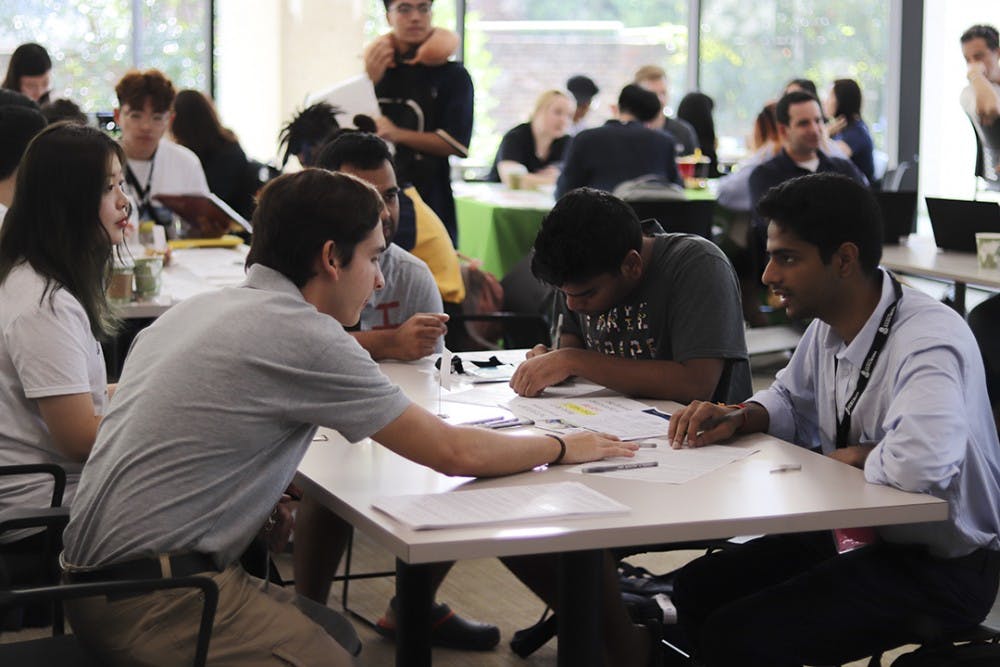Aug. 23, 2018 is still fresh in Iuliia Khamidullina’s mind. On that day — the first day of classes — she stood near the fountain outside Thomas Cooper Library.
“It was [an] incredible moment for me because my MFA program should start and my American dream comes true,” Khamidullina said.
While Khamidullina, a second-year Master of Fine Arts acting student, is about 5,000 miles away from her home in St. Petersburg, Russia. She said she feels she is in the right place with the right people.
Can Yasar, a second-year Master of Fine Arts acting student from Turkey, received a bachelor’s degree in New York City and is at USC for one more year. He said his time in the United States has revealed prejudices that are a part of the culture.
“They just look at you, just by because of your color they assume certain things or because of your name,” Yasar said.
His first name is Muhammed. However, he said goes by his middle name to avoid people forming preconceived notions about him. He said his perception of America was a land of the free, but he has realized not everyone is accepted or understood.
“I think what's surprising was that what you see from the movies and everything, that's not the America. There is a huge other part of it where most of us won't be really actually welcomed,” Yasar said.
Chris Reid, assistant director for retention and integration services for USC’s International Student Services, focuses on domestic support for international students and helps them integrate into American culture.
“If you are reluctant to talk with people or not inclined to see the value of clubs, then you are not going to integrate very well,” Reid said.
He said it’s difficult to spot those who are not involved on campus and there are marginalized international students that go unnoticed.
Timothy Li, fourth-year finance student from Hong Kong, said he experienced isolation the first semester of college.
“I closed myself in a dorm room. I spent most of my time being online with friends back home,” Li said. “I limited my social circle to those familiar groups.”
After his first semester, he got involved with clubs on campus that he said gave him a sense of belonging. He mostly became friends with American students.
“I’m not saying there’s no cultural differences between my culture and American culture, but it’s easy for me to cling to locals instead of international students,” Li said. “So, it’s the opposite of what international students usually do.”
Reid said international students often seek out friends from their home country because of the comfort and familiarity. The term “Chinese bubble” is used to describe this occurrence since Chinese students make up the largest percentage of international students nationally and at USC, Reid said.
Out of the university’s 1,891 international students, 708 are Chinese, according to the 2018 demographic report from International Student Services.
Long Ling, fourth-year management student from China, said it’s easier for her to make Chinese friends because she is shy.
“I will feel more confident to voice my opinions with Chinese friends,” Ling said. “American people are so independent.”
She said she’ll befriend American students in her classes, but they’ll ignore her when she waves to them outside of class.
Reid said the concept of friendship doesn’t translate easily across cultures and Americans are likely to exchange niceties with strangers but oftentimes don’t take the next step to becoming friends, whereas international students do.
Language is another factor that can make integration difficult. Reid said international students are often reluctant to speak English because they’re afraid they will be judged by their accent or inability to speak perfect English.
There is a wide range of language proficiency among international students. Traditional international students who are fully enrolled have high language proficiency. Then, there are students in the English Programs for Internationals, which is a program for non-degree seeking students that focuses on language development. This means some international students on campus are fluent while others speak very little English.
“Language, it’s a challenge, but I can figure out it. It’s not the hardest thing actually,” Khamidullina said.
Even with a high level of proficiency, international students have to learn legal terms, healthcare terms and other cultural nuances that aren’t taught in the classroom.
Ling plans on going to graduate school in America but will most likely go back to China after that.
“It is more and more difficult to stay here, so I gave up,” Ling said.
Post-graduation holds a different type of uncertainty for international students. Many times, the option is to either go to graduate school or go back home.
“For us, stakes are very high here … because then at the end of it, you are required to go back home,” Yasar said.
Yasar said he will try to get an artist visa, but also said those are difficult to get. He said jokingly that means he has two years to win an Oscar or Tony.
Li is in the process of becoming an American citizen so he can work in the United States after college.
Reflecting on the past year, Khamidullina said the opportunities she’s been given as an international student have pushed her outside of her comfort zone and caused her to grow up quickly. While she said she is Russian in her soul, living in America has given her more confidence and strength as a woman.
“As an international, you have to have big motivation," Khamidullina said. "That makes you keep going every day and attract what you want."

